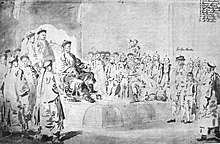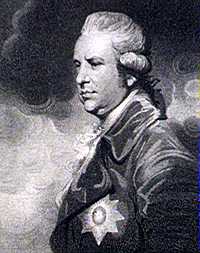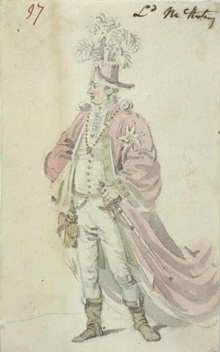George Macartney, 1st Earl Macartney
- George Macartney should not be confused with Sir George Macartney, a later British statesman.
The Right Honourable The Earl Macartney KB | |
|---|---|
 Portrait of Lord Macartney by Lemuel Francis Abbott. | |
| Governor of Grenada | |
In office 1776–1779 | |
| Monarch | George III |
| Preceded by | William Young |
| Succeeded by | Jean-François, comte de Durat |
| Governor of Madras | |
In office 22 June 1781 – 14 June 1785 | |
| Monarch | George III |
| Preceded by | Sir Thomas Rumbold |
| Succeeded by | Sir Archibald Campbell |
| Governor of Cape Colony | |
In office 1797–1798 | |
| Monarch | George III |
| Preceded by | Abraham Josias Sluysken |
| Succeeded by | Francis Dundas |
| Personal details | |
| Born | (1737-05-14)14 May 1737 Lissanoure, Loughguile, Ballymoney, County Antrim Ireland |
| Died | 31 May 1806(1806-05-31) (aged 69) Chiswick, Middlesex, England, United Kingdom |
| Alma mater | Trinity College, Dublin |
George Macartney, 1st Earl Macartney, KB (14 May 1737 – 31 May 1806) was a British statesman, colonial administrator and diplomat. He is often remembered for his observation following Britain's success in the Seven Years War and subsequent territorial expansion at the Treaty of Paris that Britain now controlled "a vast Empire, on which the sun never sets".
Contents
1 Early years
2 Governor of Grenada
3 Governor of Madras
4 Embassy to China
4.1 Selected quotes
5 Later life
6 See also
7 Notes
8 References
9 External links
Early years
He was an Irishman descended from an old Scottish family, the Macartneys of Auchenleck, Kirkcudbrightshire who had settled in 1649 at Lissanoure, in Loughguile, Ballymoney, County Antrim, Ireland, where he was born. He was the only son of George Macartney and Elizabeth Winder. After graduating from Trinity College, Dublin, in 1759, he became a student of the Temple, London. Through Stephen Fox, elder brother of Charles James Fox, he was taken up by Lord Holland.
Appointed envoy extraordinary to Russia in 1764, he succeeded in negotiating with Catherine II an alliance between Great Britain and that country. He was returned in 1768 to the Irish House of Commons as Member of Parliament for Armagh Borough, in order to discharge the duties of Chief Secretary for Ireland. On resigning this office he was knighted.
In 1775 he became governor of the British West Indies and was created Baron Macartney in the Peerage of Ireland in 1776. He was elected to a seat in the British parliament (Bere Alston) from 1780 to 1781.
Governor of Grenada
Macartney was the Governor of Grenada from 1776 to 1779.
During his governance, the island was attacked in July 1779 by French royal fleet of the Comte d'Estaing. After losing control of the fortifications on Hospital Hill (an essential defence position located on a prominence overlooking the island capital St. George's), Macartney chose to surrender unconditionally.
Governor of Madras
Macartney was the Governor of Madras (now known as Chennai) from 1781 to 1785. During his tenure as governor, renovation and strengthening of the walls of Fort St. George was commenced after the siege of Lally and completed in 1783. It was also during this time that most of the buildings and barracks in the western portion of the Fort were erected. The Palace Street, the Arsenal, the Hanover square and the Western Barracks were constructed during this time. The streets in the eastern side of the Fort were also altered.
It was also during this time that idea of a police force for Madras was thought of. Popham, the brainchild of the street which would bear his name (Popham's Broadway) submitted a plan for the establishment of a regular police force for Madras and for the building of direct and cross drains in every street. He also advocated measures for the naming and lighting of streets, for the regular registration of births and deaths and for the licensing of liquor, arrack and toddy shops. A Board of Police assisted by a Kotwal was subsequently formed. The Kotwal was to be the officer of the markets under the Superintendent of Police.[1]
He negotiated the Treaty of Mangalore which brought an end to the Second Anglo-Mysore War in 1784.[2]
Macartney declined the governor-generalship of India (then the British territories administered by the British East India Company) and returned to Britain in 1786.
Embassy to China

Lord Macartney saluting the James GillrayQianlong Emperor, 1793.

Engraving of Lord Macartney
After being created Earl Macartney in the Irish peerage (1792), he was appointed the first envoy of Britain to China, after the failure of a number of previous embassies, including Cathcart's. He led the Macartney Embassy to Beijing in 1792 with a large British delegation on board a 64-gun man-of-war, HMS Lion under the command of Captain Sir Erasmus Gower. The embassy was ultimately not successful in its primary aim to open trade with China, although numerous secondary purposes were attained, including first-hand assessment of the strength of the Chinese empire. The failure to obtain trade concessions was not due to Macartney's refusal to kowtow in the presence of the Qianlong Emperor, as is commonly believed. It is probably described most neutrally as a result of competing world views which were uncomprehending and incompatible. After the conclusion of the embassy, Qianlong sent a letter to King George III, explaining in greater depth the reasons for his refusal to grant the requests of the embassy.[3]

The reception of the diplomatique and his suite, at the Court of Pekin by James Gillray
The Macartney Embassy is historically significant because it marked a missed opportunity by the Chinese to move toward some kind of accommodation with the West. This failure would continue to plague the Qing Dynasty as it encountered increasing foreign pressures and internal unrest during the 19th century.
The policies of the Thirteen Factories remained. The embassy returned to Britain in 1794 without obtaining any concession from China. However, the mission could be construed as a success because it brought back detailed observations. Sir George Staunton was charged with producing the official account of the expedition after their return. This multi-volume work was taken chiefly from the papers of Lord Macartney and from the papers of Sir Erasmus Gower, who was Commander of the expedition. Gower also left a more personal record through his private letters to Admiral John Elliot (Royal Navy officer) and Captain Sir Henry Martin, 1st Baronet (Comptroller of the Navy). [4]Joseph Banks, the President of the Royal Society, was responsible for selecting and arranging engraving of the illustrations in this official record.[5]

Lord Macartney
Macartney was expected to lead an embassy to Japan after he completed his mission to China, but his hopes of being able to proceed to Japan were ended by the confirmation when he returned to Canton of news of the outbreak of war with France and consequently of the vulnerability of his ships to attack by French cruisers operating from Batavia.[6] On 23 December, Macartney recorded in his journal: "I have given up my projected visit to Japan, which (though now less alluring in prospect) has always been with me a favourite adventure as a possible opening of a new mine for the exercise of our industry and the purchase of our manufactures".[7]
Selected quotes
Macartney's journal from the embassy to China included observations and opinions which have become famously associated with the British diplomat:[8]
| “ | The Empire of China is an old, crazy, first-rate Man of War, which a fortunate succession of able and vigilant officers have contrived to keep afloat for these hundred and fifty years past, and to overawe their neighbours merely by her bulk and appearance. But whenever an insufficient man happens to have the command on deck, adieu to the discipline and safety of the ship. She may, perhaps, not sink outright; she may drift some time as a wreck, and will then be dashed to pieces on the shore; but she can never be rebuilt on the old bottom.[9] | ” |
| “ | The breaking-up of the power of China (no very improbable event) would occasion a complete subversion of the commerce, not only of Asia, but a very sensible change in the other quarters of the world. The industry and the ingenuity of the Chinese would be checked and enfeebled, but they would not be annihilated. Her ports would no longer be barricaded; they would be attempted by all the adventures of all trading nations, who would search every channel, creek, and cranny of China for a market, and for some time be the cause of much rivalry and disorder. Nevertheless, as Great Britain, from the weight of her riches and the genius and spirits of her people, is become the first political, marine, and commercial Power on the globe, it is reasonable to think that she would prove the greatest gainer by such a revolution as I have alluded to, and rise superior over every competitor.[10] | ” |
Later life
On his return from a confidential mission to Italy in 1795, he was raised to the British peerage as Baron Macartney, and in the end of 1796 was appointed governor of the newly acquired territory of the Cape Colony, where he remained until ill health compelled him to resign in November 1798. In early 1797 he was requested to assist with the proposed plan to send an attacking force from the Cape under Major-General J. H. Craig to the South West coast of Spanish America by way of the British colony in New South Wales.[11] He died at Chiswick, Middlesex, on 31 May 1806, the title becoming extinct. After the death of his widow (Lady Jane Stuart, daughter of the 3rd Earl of Bute; they were married in 1768), his property passed to his niece, whose son took the name.
See also
| Wikiquote has quotations related to: George Macartney |
Isaac Titsingh, the ambassador who represented the Netherlands and VOC to greet Qianlong Emperor
- William Pitt Amherst, 1st Earl Amherst
- Andreas Everardus van Braam Houckgeest
Halliday Macartney - a descendant of the Macartney family who served in China under Charles Gordon during the Taiping Rebellion
Notes

Allegorical engraving of George Macartney after his capture at the battle of Grenada (1779).

Lord Macartney's uniform as ambassador to China (1793).
^ Reforms of George MaCartney from 'Corporation of Chennai' website
^ Turnbull p.180
^ Ch'ien Lung, (Qianlong) Letter to George III
^ Bates, Ian M. (2017). Champion of the Quarterdeck: Admiral Sir Erasmus Gower (1742-1814). Sage Old Books. p. 171-206. ISBN 9780958702126..mw-parser-output cite.citation{font-style:inherit}.mw-parser-output .citation q{quotes:"""""""'""'"}.mw-parser-output .citation .cs1-lock-free a{background:url("//upload.wikimedia.org/wikipedia/commons/thumb/6/65/Lock-green.svg/9px-Lock-green.svg.png")no-repeat;background-position:right .1em center}.mw-parser-output .citation .cs1-lock-limited a,.mw-parser-output .citation .cs1-lock-registration a{background:url("//upload.wikimedia.org/wikipedia/commons/thumb/d/d6/Lock-gray-alt-2.svg/9px-Lock-gray-alt-2.svg.png")no-repeat;background-position:right .1em center}.mw-parser-output .citation .cs1-lock-subscription a{background:url("//upload.wikimedia.org/wikipedia/commons/thumb/a/aa/Lock-red-alt-2.svg/9px-Lock-red-alt-2.svg.png")no-repeat;background-position:right .1em center}.mw-parser-output .cs1-subscription,.mw-parser-output .cs1-registration{color:#555}.mw-parser-output .cs1-subscription span,.mw-parser-output .cs1-registration span{border-bottom:1px dotted;cursor:help}.mw-parser-output .cs1-ws-icon a{background:url("//upload.wikimedia.org/wikipedia/commons/thumb/4/4c/Wikisource-logo.svg/12px-Wikisource-logo.svg.png")no-repeat;background-position:right .1em center}.mw-parser-output code.cs1-code{color:inherit;background:inherit;border:inherit;padding:inherit}.mw-parser-output .cs1-hidden-error{display:none;font-size:100%}.mw-parser-output .cs1-visible-error{font-size:100%}.mw-parser-output .cs1-maint{display:none;color:#33aa33;margin-left:0.3em}.mw-parser-output .cs1-subscription,.mw-parser-output .cs1-registration,.mw-parser-output .cs1-format{font-size:95%}.mw-parser-output .cs1-kern-left,.mw-parser-output .cs1-kern-wl-left{padding-left:0.2em}.mw-parser-output .cs1-kern-right,.mw-parser-output .cs1-kern-wl-right{padding-right:0.2em}
^ Banks, Joseph. State Library of New South Wales, Papers of Sir Joseph Banks; Section 12: Lord Macartney’s embassy to China; Series 62: Papers concerning publication of the account of Lord Macartney's Embassy to China, ca 1797.
^ Robert J. King, "'The long wish'd for object' — Opening the trade to Japan, 1785-1795", The Northern Mariner / le marin du nord, vol.XX, no.1, January 2010, pp.1-35, pp.30-33.[1]
^ Cranmer-Byng, "Russian and British Interests in the Far East, 1791-1793", Canadian Slavonic Papers, vol.X, 1968, pp.357-75, p.206.
^ Zhang, Xiantao. (2007). The Origins of the Modern Chinese Press: the Influence of the Protestant Missionary Press in late Qing China, p. 33, p. 33, at Google Books[dead link], excerpt, "In 1793, Lord Macartney, after failing in his diplomatic mission to make China extend trade with Britain, famously remarked that the empire of China was 'an old, crazy, first-rate Man of War', which had intimidated its neighbours 'merely by her bulk and appearance' ...."
^ Perdue, Peter. (2005). China Marches West: the Qing Conquest of Central Eurasia, p. 505, p. 505, at Google Books; Robbins, Helen Henrietta Macartney (1908). Our First Ambassador to China: An Account of the Life of George, Earl of Macartney with Extracts from His Letters, and the Narrative of His Experiences in China, as Told by Himself, 1737–1806, from Hitherto Unpublished Correspondence and Documents, p. 386., p. 386, at Google Books
^ Robbins, p. 386., p. 386, at Google Books
^ Dundas to Macartney, 21 January 1797, “Correspondence of George Macartney, 1st Earl Macartney, whilst Governor of the Cape of Good Hope”, Bodleian Library, GB 0162 MSS.Afr.t.2-4*. See also Robert J. King, "An Australian Perspective on the English Invasions of the Rio de la Plata in 1806 and 1807", International Journal of Naval History, vol. 8 no.1, April 2009, [2]
References
Barrow, John. (1807). Some Account of the Public Life, and a Selection from the Unpublished Writings, of the Earl of Macartney, 2 vols. London: T. Cadell and W. Davies.- Cranmer-Byng, J. L. "Lord Macartney’s Embassy to Peking in 1793." Journal of Oriental Studies. Vol. 4, Nos. 1,2 (1957–58): 117–187.
- Esherick, Joseph W. "Cherishing Sources from Afar." Modern China Vol. 24, No. 2 (1998): 135–61.
- Hevia, James Louis. (1995). Cherishing Men from Afar: Qing Guest Ritual and the Macartney Embassy of 1793. Durham: Duke University Press.
ISBN 978-0-8223-1637-4
- Hibbert, Christopher. "The Dragon Wakes. China and the West, 1793–1911"
- Jacques, Martin. (2009). When China Rules the World: the End of the Western World and the Birth of a New Global Order. New York: Penguin Press.
ISBN 9781594201851; OCLC 423217571
- Peyrefitte, Alain. (1992). The Immobile Empire (Jon Rotschild, translator). New York: Alfred A. Knopf/Random House.
ISBN 978-0-394-58654-0
- Peyrefitte, Alain. (1990). Images de l'Empire immobile ou le choc des mondes. Récit historique. Paris: Fayard.
ISBN 978-2-213-02383-0 (paper)
- Peyrefitte, Alain. (1990). Images de l'Empire immobile ou le choc des mondes. Récit historique. Paris: Fayard.
- Robbins, Helen Henrietta Macartney (1908). Our First Ambassador to China: An Account of the Life of George, Earl of Macartney with Extracts from His Letters, and the Narrative of His Experiences in China, as Told by Himself, 1737–1806, from Hitherto Unpublished Correspondence and Documents. London : John Murray. Digitized by University of Hong Kong Libraries, Digital Initiatives, "China Through Western Eyes."; review in The Athenaeum
- Rockhill, William Woodville. "Diplomatic Missions to the Court of China: The Kotow Question I," The American Historical Review, Vol. 2, No. 3 (Apr. 1897), pp. 427–442.
- Rockhill, William Woodville. "Diplomatic Missions to the Court of China: The Kotow Question II," The American Historical Review, Vol. 2, No. 4 (Jul. 1897), pp. 627–643.
Staunton, George Leonard. (1797). An Authentic Account of and Embassy from the King of Great Britain to the Emperor of China, 3 vols. London: G. Nichol.- Turnbull, Patrick. Warren Hastings. New English Library, 1975.
External links
George Macartney papers, Kislak Center for Special Collections, Rare Books and Manuscripts, University of Pennsylvania
 This article incorporates text from a publication now in the public domain: Chisholm, Hugh, ed. (1911). . Encyclopædia Britannica. 17 (11th ed.). Cambridge University Press. p. 193.
This article incorporates text from a publication now in the public domain: Chisholm, Hugh, ed. (1911). . Encyclopædia Britannica. 17 (11th ed.). Cambridge University Press. p. 193.
| Political offices | ||
|---|---|---|
| Preceded by The Lord Frederick Campbell | Chief Secretary for Ireland 1769–1772 | Succeeded by Sir John Blaquiere |
| Government offices | ||
| Preceded by William Young | Governor of Grenada 1776–1779 | Succeeded by Jean-François, comte de Durat as Governor-General of Grenada |
New creation | Governor of the Cape Colony 1797–1798 | Succeeded by Francis Dundas, acting |
Parliament of Ireland | ||
| Preceded by Robert Cuninghame Hon. Barry Maxwell | Member of Parliament for Armagh Borough 1768–1776 With: Philip Tisdall 1768–1769 Charles O'Hara 1769–1776 | Succeeded by Philip Tisdall Henry Meredyth |
Parliament of Great Britain | ||
| Preceded by Sir John Mordaunt John Elliot | Member of Parliament for Cockermouth 1768–1769 With: Charles Jenkinson (1768) George Johnstone (1768–1769) | Succeeded by George Johnstone Sir James Lowther |
| Preceded by James Archibald Stuart | Member of Parliament for Ayr Burghs 1774–1776 | Succeeded by Frederick Stuart |
| Preceded by Sir Francis Henry Drake Hon. George Hobart | Member of Parliament for Bere Alston 1780–1781 With: Lord Algernon Percy (1780) Viscount Feilding (1781) | Succeeded by Viscount Feilding Laurence Cox |
| Diplomatic posts | ||
| Preceded by The Earl of Buckinghamshire | Ambassador from Great Britain to Russia 1764–1766 | Succeeded by Hans Stanley |
| Preceded by Hans Stanley | Ambassador from Great Britain to Russia 1767–1768 | Succeeded by The Lord Cathcart |
| Preceded by | Ambassador from Great Britain to China 1792–1794 | Succeeded by George Elliot (1784–1863) |
Peerage of Ireland | ||
New creation | Earl Macartney 1792–1806 | Extinct |
Baron Macartney 1776–1806 | ||
Peerage of Great Britain | ||
New creation | Baron Macartney 1795–1806 | Extinct |